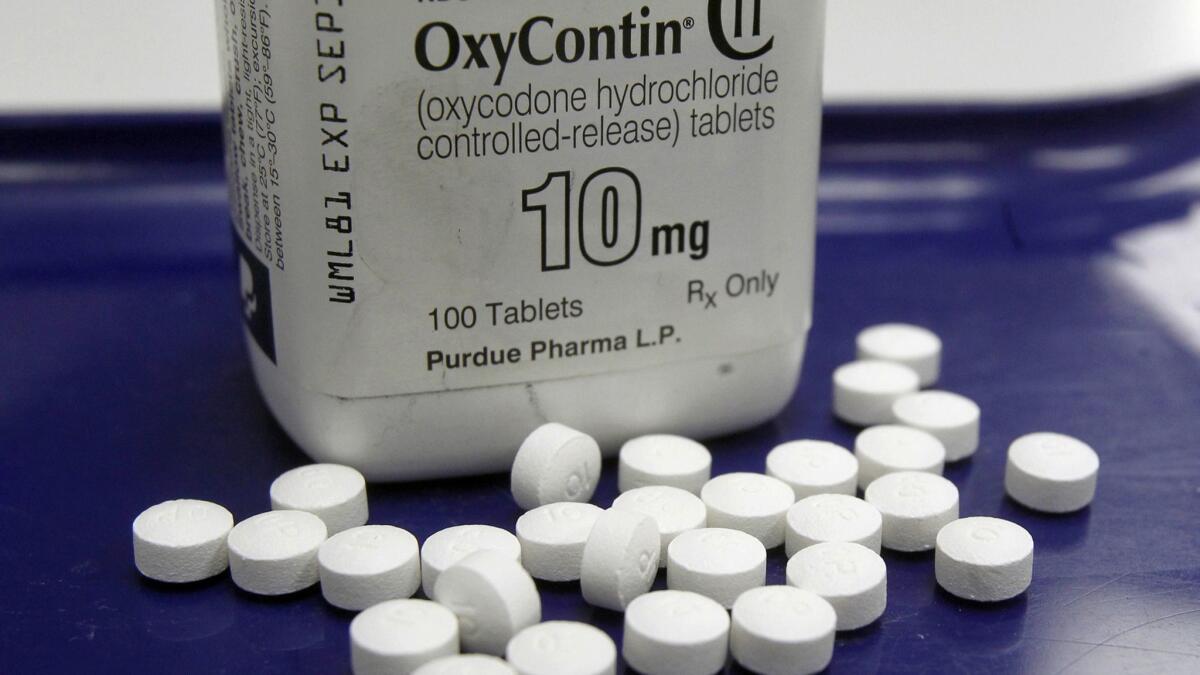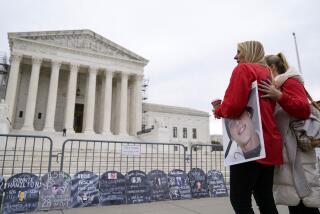Purdue Pharma’s Sackler family wants opioid lawsuit thrown out

The family that controls OxyContin maker Purdue Pharma has asked for the dismissal of a Massachusetts lawsuit that alleges the company fueled the opioid epidemic. The suit relies on false assertions, the Sackler family argues.
In a motion delivered Tuesday to Massachusetts Atty. Gen. Maura Healey, lawyers for members of the Sackler family argue that Healey’s lawsuit contains “misleading and inflammatory allegations” and takes internal company emails out of context in alleging that the Sackler family and Purdue deserve accountability for the addiction and deaths that opioids have spread across the country.
“We are confident the court will look past the inflammatory media coverage generated by the misleading complaint and apply the law fairly by dismissing all of these claims,” Sackler family members said in a statement Tuesday.
Healey’s lawsuit, filed in June, alleges that individual members of the Sackler family engaged in acts of deception and misconduct to make as much money as possible from sales of OxyContin, a powerful prescription painkiller. Healey accuses the family of disregarding addiction and safety in the name of profit. She alleges that members of the family directed sales representatives to push high doses of the drug while knowing its potential dangers.
The family says it acted in a routine way for members of a corporate board: reviewing voluminous documents including budget presentations, spreadsheets and reports about Purdue’s nationwide operations.
“Not a single document shows an individual director engaging in any unlawful conduct regarding the sale of prescription opioids or ordering anyone else to do so,” the Sacklers’ motion says, noting that there were no examples of the board “engaging in unlawful conduct or directing others to do so.”
The Sacklers’ lawyers also say portions of emails Healey used to show allegedly egregious conduct were taken out of context and do not reflect what she alleges in the lawsuit.
Healey’s lawsuit says that at an OxyContin launch party in 1996, Richard Sackler told the crowd to imagine natural disasters, such as a hurricane or blizzard. “The launch of OxyContin Tablets will be followed by a blizzard of prescriptions that will bury the competition,” Healey alleges Sackler said, according to an email quoted in the documents.
The Sacklers say the remarks were an allusion, referencing “his delayed arrival at that event due to the well-known Blizzard of 1996.”
Healey’s lawsuit also contends that the Sackler family considered a plan called Project Tango that would have allowed the company to get into the business of selling drugs aimed at counteracting opioid abuse. The family says in court papers that Project Tango was a plan floated by a third-party private equity firm that was “subsequently abandoned.”
The Sackler family is facing increased scrutiny and legal claims surrounding its alleged role in the opioid crisis; Purdue Pharma made billions of dollars in the last two decades as its popular opioids were heavily prescribed, and many of the company’s pills were diverted to a thriving black market.
The New York attorney general asserted in a lawsuit filed last week that the Sackler family steered hundreds of millions of dollars away from Purdue and into personal offshore accounts. Members of the Sackler family paid $75 million in personal funds as part of a $270-million out-of-court settlement between Purdue and the Oklahoma attorney general last week. The Sacklers were not personally named as defendants in that case.
Healey’s suit is among a number of recent lawsuits to accuse the Sackler family, and not just Purdue, of wrongdoing. Her office plans to oppose the dismissal motion.
“Our complaint makes clear the role that Purdue’s executives and directors played in creating and profiting from the opioid crisis,” Healey said in a statement. “Their motions are an attempt to avoid accountability. We will continue our work to expose the conduct that hurt so many families in Massachusetts.”
The Sacklers have donated massive amounts of money to philanthropies and art institutions around the world, many of which are now dealing with blowback and protests because of the allegations regarding the family’s role in the opioid crisis.
The family’s philanthropic trust announced last week that it would stop making donations after the National Portrait Gallery and Tate galleries in London and the Guggenheim Museum in New York announced they would no longer take money from the Sacklers.
More to Read
Inside the business of entertainment
The Wide Shot brings you news, analysis and insights on everything from streaming wars to production — and what it all means for the future.
You may occasionally receive promotional content from the Los Angeles Times.









